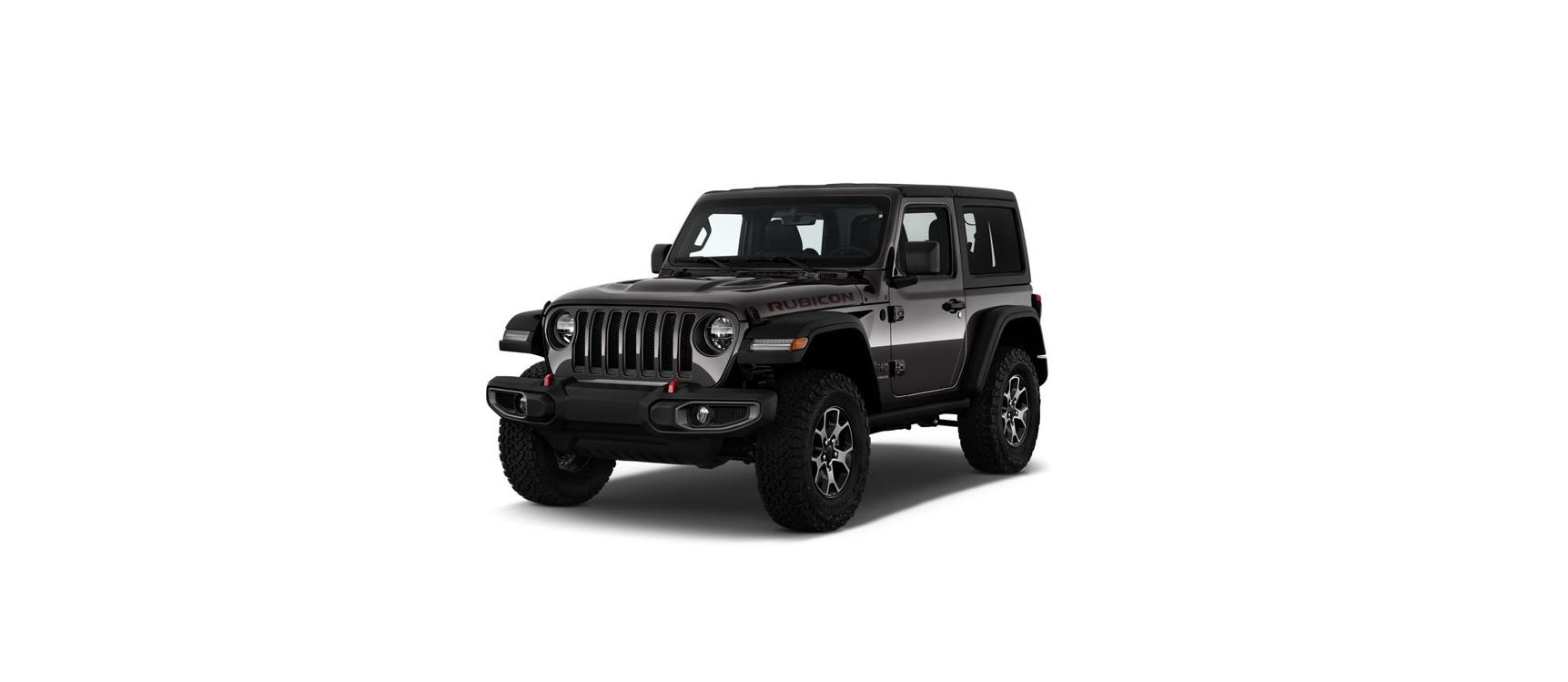2022 Jeep Wrangler Seats
SEATS
Seats are a part of the Occupant Restraint system of the vehicle.
WARNING
- It is dangerous to ride in a cargo area, inside or outside of a vehicle. In a collision, people riding in these areas are more likely to be seriously injured or killed.
- Do not allow people to ride in any area of your vehicle that is not equipped with seats and seat belts. In a collision, people riding in these areas are more likely to be seriously injured or killed.
- Be sure everyone in your vehicle is in a seat and using a seat belt properly.
MANUAL ADJUSTMENT FRONT SEATS
Manual Front Seat Forward/Rearward Adjustment
The seat can be adjusted forward or rearward by using a bar located by the front of the seat cushion, near the floor. While sitting in the seat, lift up on the bar located under the seat cushion and move the seat forward or rearward. Release the bar once you have reached the desired position. Then, using body pressure, move forward and rearward on the seat to be sure that the seat adjusters have latched.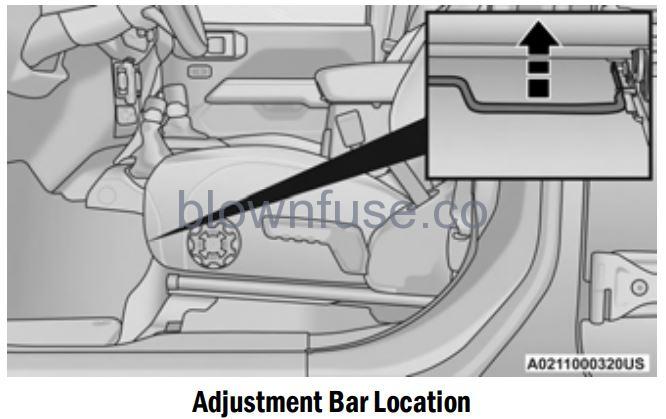
WARNING
- Adjusting a seat while driving may be dangerous. Moving a seat while driving could result in loss of control which could cause a collision and serious injury or death.
- Seats should be adjusted before fastening the seat belts and while the vehicle is parked. Serious injury or death could result from a poorly adjusted seat belt.
Manual Seat Height Adjustment
The driver’s seat height can be raised or lowered by using the ratcheting handle, located on the outboard side of the seat. Pull upward on the handle to raise the seat, push down on the handle to lower the seat. Several strokes may be necessary to achieve the desired position.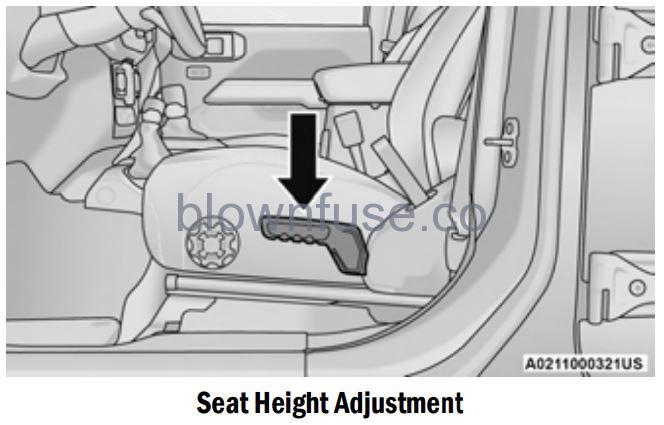
Manual Front Seat Recline Adjustment
To recline the seat, pull on the recline strap and lean forward or backward, depending on the direction you would like the seatback to move. Release the strap when the desired position is reached and the seatback will lock into place.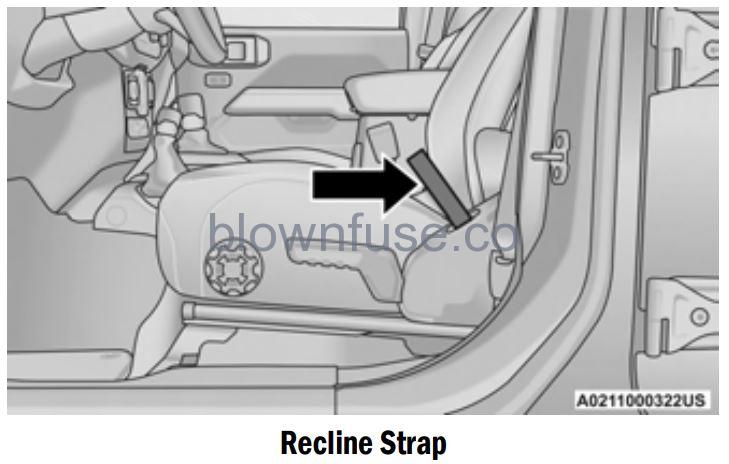
WARNING
Do not ride with the seatback reclined so that the shoulder belt is no longer resting against your chest. In a collision you could slide under the seat belt, which could result in serious injury or death.
Lumbar Support
The lumbar control knob is located on the outboard side of the front driver seat. Rotate the control forward to increase and rearward to decrease the desired amount of lumbar support.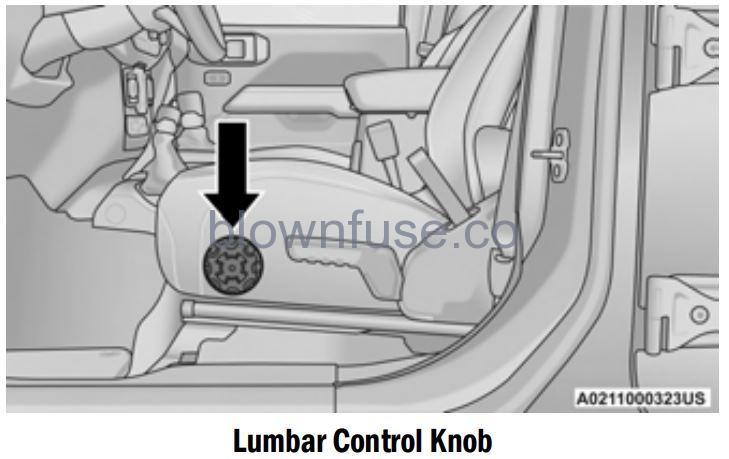
Front Passenger Easy Entry Seat — Two Door Models
Pull upward on the easy entry lever located on the outboard side of the seatback, and slide the entire seat forward.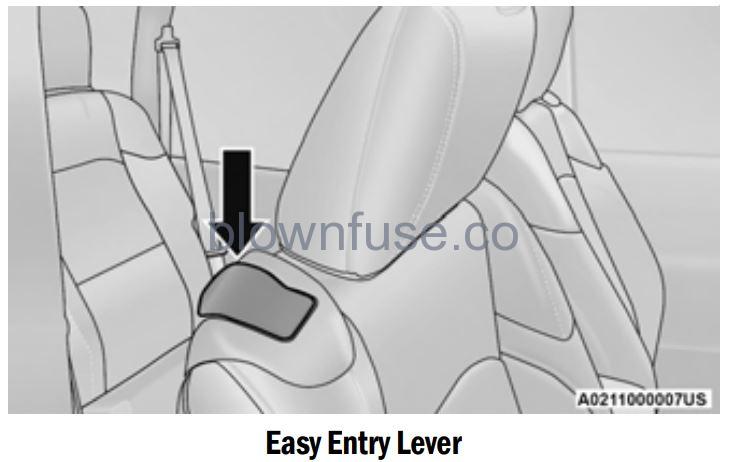
To return the seat to a sitting position, fold the seatback upright until it locks and push the seat rearward until the track locks.
NOTE
- The front passenger seats have a tracking memory, which returns the seat to its original position.
- The recline strap and easy entry lever should not be used during the automatic returning of the seat to its sitting position.
60/40 SPLIT-FOLDING REAR SEAT — FOUR-DOOR MODELS
To provide an additional storage area, each rear seat can be folded flat to allow for extended cargo space.
NOTE
- Be sure that the front seats are fully upright and positioned forward. This will allow the rear seat to fold down easily.
- The center head restraints must be in the lowest position to avoid contact with the center console when folding the seat.
WARNING
- It is extremely dangerous to ride in a cargo area, inside or outside of a vehicle. In a collision, people riding in these areas are more likely to be seriously injured or killed.
- Do not allow people to ride in any area of your vehicle that is not equipped with seats and seat belts.
- Be sure everyone in your vehicle is in a seat and using a seat belt properly
To Fold Down The Rear Seat
There are two release levers located on each upper outboard side of the rear seat. The larger of the two release levers folds down the seat and the head restraint simultaneously. The smaller lever folds down the head restraint independently for improved visibility.
To fold the seat, lift upward on the large release lever and slowly fold down the seatback. The head restraint will fold automatically with the seat when this lever is pulled.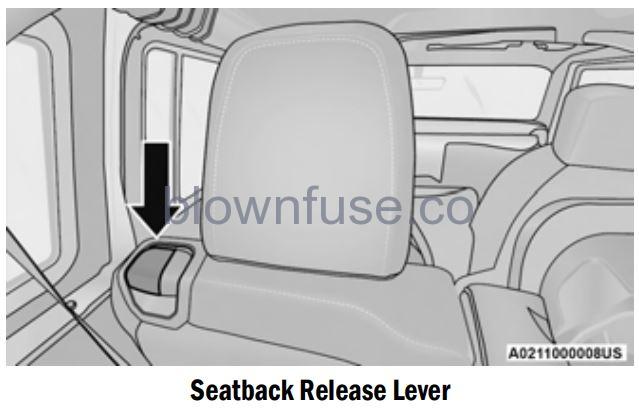
NOTE
You may experience deformation in the seat cushion from the seat belt buckles if the seats are left folded for an extended period of time. This is normal. By simply unfolding the seats to the open position, the seat cushion will return to its normal shape over time.
To Raise The Rear Seat
Raise the seatback and lock it into place. Then, raise the head restraint until it locks into place. If interference from the cargo area prevents the seatback from fully locking, you will have difficulty returning the seat to its proper position.
WARNING
Be certain that the seatback is securely locked into position. If the seatback is not securely locked into position the seat will not provide the proper stability for child seats and/or passengers. An improperly latched seat could cause serious injury.
FOLD AND TUMBLE REAR SEAT — TWO DOOR MODELS
NOTE
- Prior to folding the rear seat, it may be necessary to reposition the front seats.
- Be sure that the front seats are fully upright and positioned forward. This will allow the rear seat to fold down easily.
Folding The Rear Seat
- Lift the seatback release lever and fold the seatback forward.
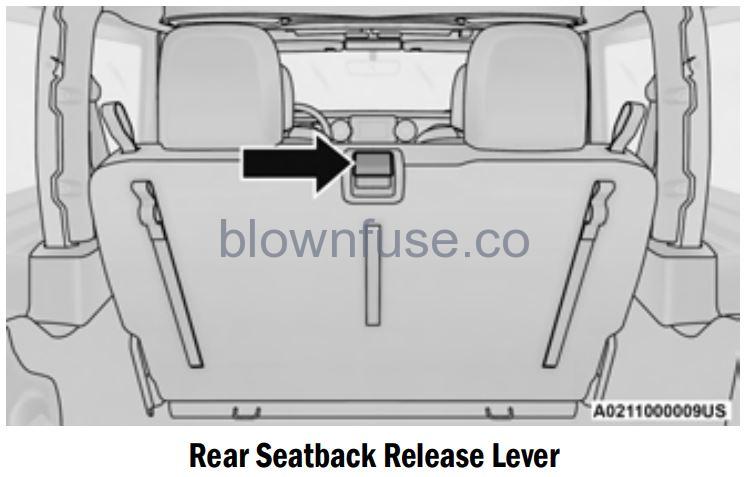
- Slowly flip the entire seat forward.
Using The Retention Straps
- There are two retention straps located on the back of the rear seat and two corresponding wire loops located on the back of each B-pillar. Open the hook-and-loop fastener on the strap and thread through the wire loop. Fold the hook-and-loop fastener over to keep the seat in the folded position. This should be done on both sides.
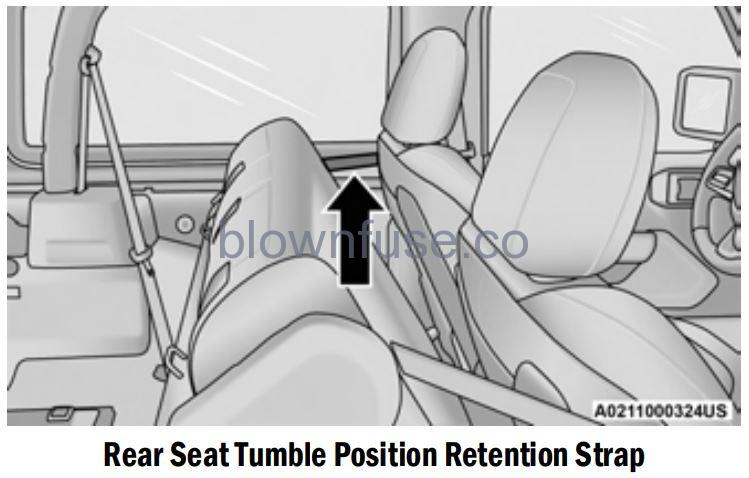
- To return the seat to its normal upright position, reverse these steps.
Removing The Rear Seat
- Push down on the release bar on each side, and pull the seat out and away from the lower bracket.
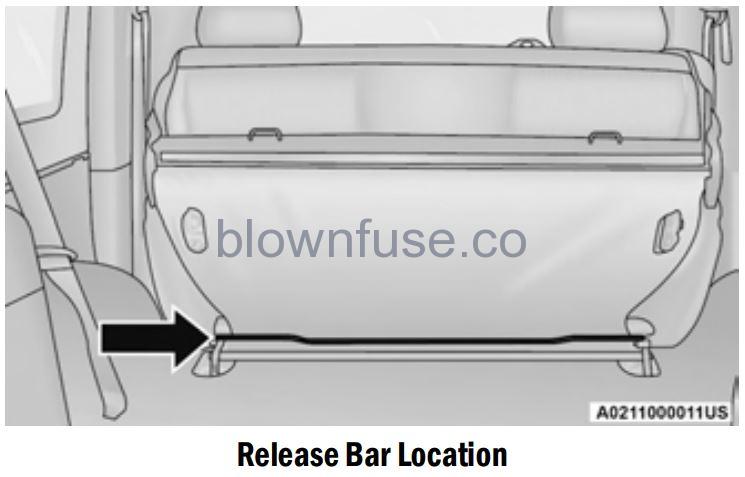
- Remove the seat from the vehicle.
- To reinstall the rear seat, just reverse these steps.
NOTE
Do not drive the vehicle without reattaching the rear seat latches.
WARNING
- It is extremely dangerous to ride in a cargo area, inside or outside of a vehicle. In a collision, people riding in these areas are more likely to be seriously injured or killed.
- Do not allow people to ride in any area of your vehicle that is not equipped with seats and seat belts.
- Be sure everyone in your vehicle is in a seat and using a seat belt properly.
- In a collision, you or others in your vehicle could be injured if seats are not properly latched to their floor attachments. Always be sure that the seats are fully latched.
HEATED SEATS — IF EQUIPPED
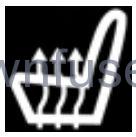 The heated seat control buttons are located on the center instrument panel below the touchscreen and also in the Climate Control touchscreen menu.
The heated seat control buttons are located on the center instrument panel below the touchscreen and also in the Climate Control touchscreen menu.
- Push the heated seat button once to turn the HI setting on.
- Push the heated seat button a second time to turn the MED setting on.
- Push the heated seat button a third time to turn the LO setting on.
- Push the heated seat button a fourth time to turn the heating elements off.
NOTE
- The engine must be running for the heated seats to operate.
- The level of heat selected will stay on until the operator changes it.
For information on use with the Remote Start system, see page 22.
WARNING
- Persons who are unable to feel pain to the skin because of advanced age, chronic illness, diabetes, spinal cord injury, medication, alcohol use, exhaustion or other physical condition must exercise care when using the seat heater. It may cause burns even at low temperatures, especially if used for long periods of time.
- Do not place anything on the seat or seatback that insulates against heat, such as a blanket or cushion. This may cause the seat heater to overheat. Sitting in a seat that has been overheated could cause serious burns due to the increased surface temperature of the seat.
REAR SEAT ARMREST — IF EQUIPPED
The center part of the rear seat can also be used as a rear armrest with cupholders. To unfold it, grab the pull strap under the head restraint and pull it forward.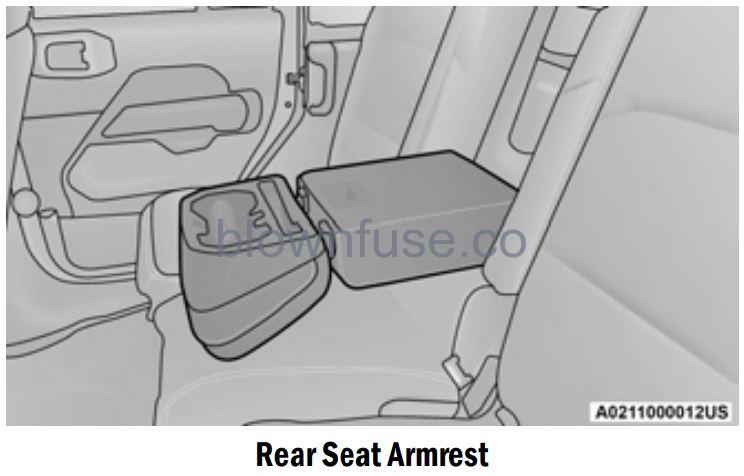
NOTE
The cupholder liner can be removed for cleaning.
WARNING
Be certain that the seatback is securely locked into position. If the seatback is not securely locked into position the seat will not provide the proper stability for child seats and/or passengers. An improperly latched seat could cause serious injury.
HEAD RESTRAINTS
Head restraints are designed to reduce the risk of injury by restricting head movement in the event of a rear impact. Head restraints should be adjusted so that the top of the head restraint is located above the top of your ear.
WARNING
- All occupants, including the driver, should not operate a vehicle or sit in a vehicle’s seat untilthe head restraints are placed in their proper positions in order to minimize the risk of neck injury in the event of a crash.
- Head restraints should never be adjusted while the vehicle is in motion. Driving a vehicle with the head restraints improperly adjusted or removed could cause serious injury or death in the event of a collision.
Front Head Restraints
To raise the head restraint, pull upward on the head restraint. To lower the head restraint, push the adjustment button located on the base of the head restraint, and push downward on the head restraint. The release button does not need to be pushed to adjust the head restraint.
To remove the head restraint, raise it as far as it can go then push the adjustment button and the release button at the base of each post while pulling the head restraint up. To reinstall the head restraint, put the head restraint posts into the holes and push downward. Then adjust it to the appropriate height.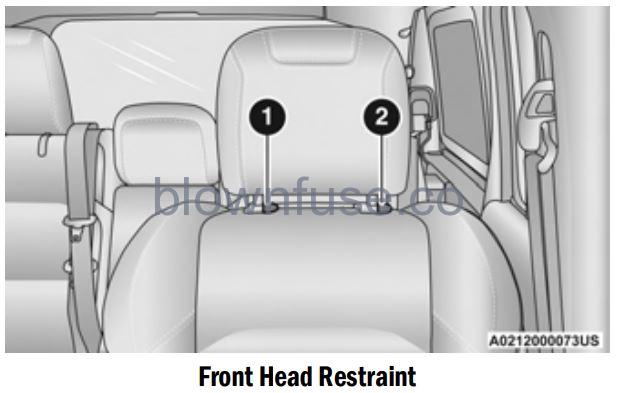
- Release Button
- Adjustment Button
WARNING
- A loose head restraint thrown forward in a collision or hard stop could cause serious injury or death to occupants of the vehicle. Always securely stow removed head restraints in a location outside the occupant compartment.
- ALL the head restraints MUST be reinstalled in the vehicle to properly protect the occupants.Follow the reinstallation instructions prior to operating the vehicle or occupying a seat.
NOTE
Do not reposition the head restraint 180 degrees to the incorrect position in an attempt to gain additional clearance to the back of the head.
Rear Head Restraints — Two Door Models
The rear seat is equipped with non-adjustable, but foldable head restraints. To fold the outboard head restraint, pull on the release strap located on the upper outboard side of each rear seat.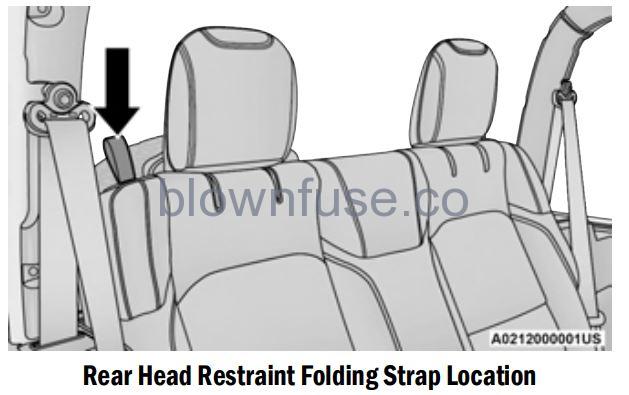
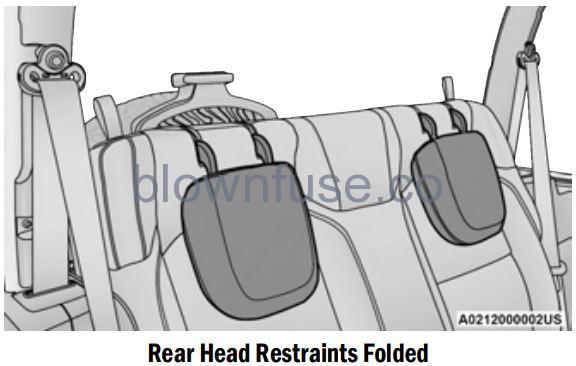 To return the head restraint to its upward position, lift up on the head restraint until it locks into place.
To return the head restraint to its upward position, lift up on the head restraint until it locks into place.
For information on child seat tether routing, see page 295.
WARNING
- Do not drive the vehicle without the rear seat head restraints installed while passengers are occupying the rear seat. In a collision, people riding in this area without the head restraints installed are more likely to be seriously injured or killed.
- A loose head restraint thrown forward in a collision or hard stop could cause serious injury or death to occupants of the vehicle. Always securely stow removed head restraints in a location outside the occupant compartment.
- ALL the head restraints MUST be reinstalled in the vehicle to properly protect the occupants.
Follow the reinstallation instructions prior to operating the vehicle or occupying a seat.
Rear Head Restraints — Four Door Models
The rear seat is equipped with nonadjustable, but foldable, outboard head restraints, as well as an adjustable, removable center head restraint. To fold the outboard head restraint, pull on the inner release lever, located on the upper part of the rear seat.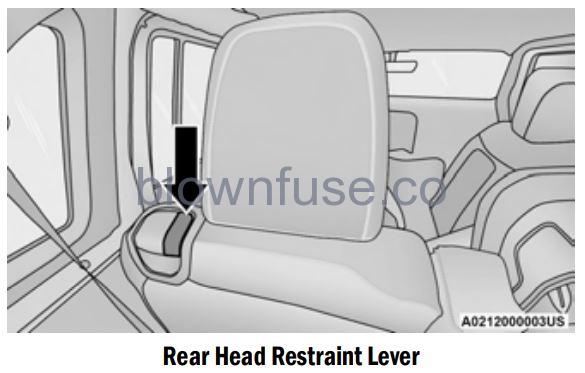
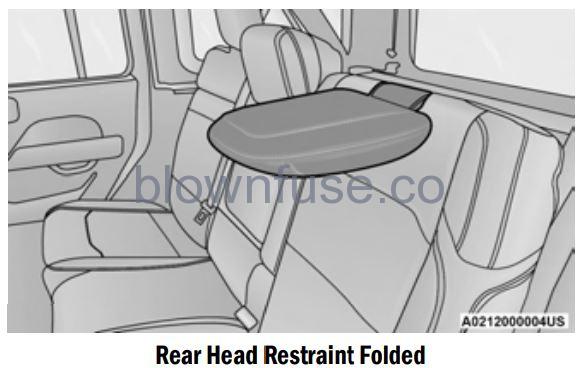
To return the head restraint to its upward position, lift up on the head restraint until it locks into place. To raise the center head restraint, lift up on the head restraint. To lower the center head restraint, push the adjustment button, located at the base of the head restraint, and push down on the head restraint.
To remove the center head restraint, push the release button, located on the base of the head restraint, and pull upward on the head restraint.To install the head restraint, hold the release button while pushing downward on the head restraint. For information on child seat tether routing, see page 295.
NOTE
Lower the center head restraint to avoid contact with the center console when folding the seat down.
WARNING
- Do not drive the vehicle without the rear seathead restraints installed while passengers are occupying the rear seat. In a collision, people riding in this area without the head restraints installed are more likely to be seriously injured or killed.
- A loose head restraint thrown forward in a collision or hard stop could cause serious injury or death to the occupants of the vehicle. Always securely stow removed head restraints in a location outside the occupant compartment.
- ALL the head restraints MUST be reinstalled in the vehicle to properly protect the occupants.
Follow the reinstallation instructions prior to operating the vehicle or occupying a seat.
